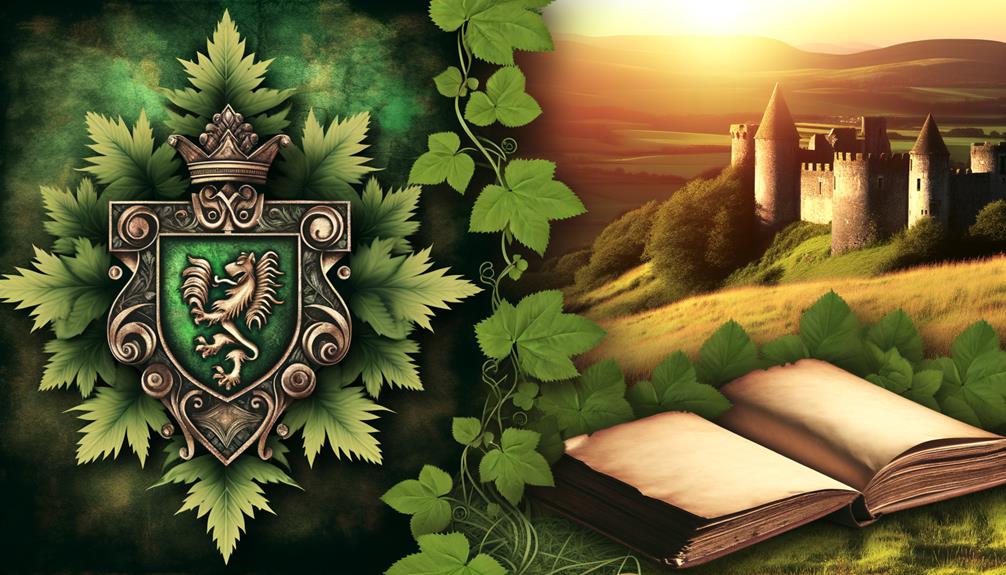Meaning of the Name Montague
The name Montague, originating from the Old French term 'mont ague', translates to 'pointed hill'. This toponymic surname reflects the medieval practice of naming based on geographical features.
Historically, it is linked to noble families from the Norman Conquest, evident in 11th and 12th-century legal documents. The name's prestige is further immortalized in literary works, notably in Shakespeare's 'Romeo and Juliet'.
Montague also appears in heraldic traditions, embodying courage and nobility. This name's legacy persists through historical accounts, literature, and modern cultural depictions, providing a fascinating insight into social history and heritage.

Key Takeaways
- Montague originates from the Old French term 'mont ague,' meaning 'pointed hill.'
- It denotes a geographic feature, combining 'mont' (mountain) and 'ague' (sharp).
- Historically associated with noble families and influential lineages in medieval England and France.
- Immortalized in literature by Shakespeare's 'Romeo and Juliet,' symbolizing conflict and loyalty.
- The Montague name carries an aura of prestige, authority, and social heritage.
Etymology and Origin
The name Montague originates from the Old French term 'mont ague,' which translates to 'pointed hill' in English. This etymology underscores the geographical and topographical influences on naming conventions during the medieval period.
The term 'mont' denotes a mountain or hill, while 'ague' implies a sharp or pointed feature. Such nomenclature was common in feudal societies, where surnames often described the physical environment or notable landmarks associated with a family's residence.
The adoption of 'Montague' as a surname reflects a historical tendency to identify individuals by their immediate surroundings, providing a clear example of how language and geography intertwine. This etymological origin offers valuable insights into the socio-linguistic patterns of naming practices in medieval France.
Historical Significance
Montague's historical importance is intricately linked to its association with noble families and its frequent appearance in literary works. This name traces back to medieval England and France, where it was borne by influential aristocratic lineages.
The Montague family, for instance, was one of the prominent noble houses during the Norman Conquest, contributing significantly to the socio-political landscape of their time. These noble connections lent the name a sense of prestige and authority.
Additionally, historical records from the 11th and 12th centuries often mention the Montagues in various legal and land documents, highlighting their economic and political influence. Therefore, the name Montague encapsulates a rich historical narrative rooted in nobility and power, resonating through centuries of European history.
Literary Connections
Renowned for its literary connections, the name Montague is most famously immortalized in William Shakespeare's tragic play 'Romeo and Juliet.'
The Montagues, one of the feuding noble families in Verona, represent a significant force in the narrative, symbolizing strife and familial loyalty. This portrayal has cemented the name Montague in the cultural lexicon as a representation of enduring conflict and tragic love.
Shakespeare's choice of the name may have historical underpinnings, yet its literary impact persists, influencing modern interpretations of familial names and societal roles.
The Montague name's association with timeless themes of love, enmity, and fate underscores its enduring relevance, demonstrating the profound ways literature can shape perceptions of identity and heritage.
Heraldry and Nobility
Beyond its literary significance, the name Montague also carries a rich history in heraldry and nobility, reflecting its roots in medieval aristocracy. The Montague family, prominent in English history, is associated with several key elements that underscore their noble status:
- Coat of Arms: The Montague coat of arms typically features a griffin, symbolizing courage and strength.
- Titles: Notable titles held by the Montague family include the Earldom of Salisbury and Duke of Montagu.
- Historical Influence: The family had significant political and social influence during the Wars of the Roses and the Tudor period.
- Estate Holdings: Montague estates, such as Boughton House, are historically significant and represent the family's wealth and power.
This legacy cements Montague's place in heraldic tradition.
Geographic Distribution
Tracing the geographic distribution of the Montague name reveals its widespread presence across various regions, particularly in England and the United States. Historically, the name Montague originates from Normandy, France, and was introduced to England during the Norman Conquest of 1066. Over centuries, the name disseminated throughout England, becoming associated with noble families and influential figures.
In the 17th century, English settlers transported the Montague name to the New World, where it took root in the American colonies. Today, the surname is prevalent in both countries, with notable concentrations in southern England and the northeastern United States. This dispersion reflects historical migration patterns and the enduring legacy of the Montague lineage.
Famous Montagues
The widespread presence of the Montague name across England and the United States has been marked by several notable individuals who have left an indelible impact on history and culture. These figures span various fields, illustrating the diverse contributions of Montagues:
- Richard Montague (1930–1971) – A prominent American mathematician and philosopher, renowned for his work in formal semantics.
- Lady Mary Wortley Montagu (1689–1762) – An English aristocrat and writer, famous for her letters and advocacy for smallpox inoculation.
- Edward Wortley Montagu (1713–1776) – An English traveler and writer, known for his extensive travel literature.
- Montague Rhodes James (1862–1936) – An influential English author and medieval scholar, best known for his ghost stories.
These individuals exemplify the name's historical and cultural significance.
Modern Usage
In modern times, the name Montague continues to be used in various contexts, reflecting its lasting legacy and adaptability.
Significantly, it retains a presence in literature, where authors use it to evoke historical depth or aristocratic connotations.
In the world of business, Montague is often chosen for brands and companies seeking an air of sophistication and tradition.
Moreover, the name has found a place in academia and scientific nomenclature, signaling respect and heritage.
This persistence underscores the name's versatility and its ability to traverse diverse domains while maintaining a semblance of its historical roots.
Such wide usage underscores the name Montague's capacity to adapt while retaining an essence of its storied past.
Cultural Impact
The name Montague has left an indelible mark on cultural history, primarily through its literary significance, especially in Shakespeare's 'Romeo and Juliet.'
Its historical context and influence extend beyond literature, reflecting socio-political dynamics of the periods in which it has been prominent.
Modern-day interpretations continue to evolve, demonstrating the name's enduring relevance in contemporary discourse.
Literary Significance and Legacy
Montague, as a name, has garnered significant cultural resonance primarily through its association with Shakespeare's iconic tragedy 'Romeo and Juliet.' The Montague family, representing one half of the feuding noble houses, has left an indelible mark on literature and popular culture.
This legacy includes:
- Symbol of Feuds: The Montagues symbolize longstanding familial and societal conflicts.
- Romantic Ideal: The name evokes the passionate, albeit tragic, love story of Romeo and Juliet.
- Adaptations: Numerous adaptations in theatre, film, and literature continue to reinforce the Montague legacy.
- Language Influence: Phrases like 'star-crossed lovers' are rooted in the Montague-Capulet narrative.
Through these elements, the name Montague transcends its literary origins, becoming a powerful symbol in the broader cultural lexicon.
Historical Context and Influence
Beyond its literary prominence, the name Montague also carries historical significance that has shaped its cultural impact through various epochs.
Originating from the Old French 'Montagu,' meaning 'pointed hill,' the name was associated with nobility and influential families in medieval Europe. The Montagues were notable during the Norman Conquest, and their lineage often intertwined with political power and land ownership. This historical backdrop infused the name with an aura of prestige and authority.
Additionally, the Montague title appeared in various historical documents, underscoring its sustained relevance. Over centuries, this legacy influenced cultural depictions, solidifying Montague as not just a surname but a symbol of heritage and social standing, resonating through literature, art, and historical accounts.
Modern-Day Interpretations
Often perceived as a hallmark of aristocracy and refined heritage, the name Montague continues to evoke a sense of historical gravitas and cultural significance in contemporary society. Its modern-day interpretations are multifaceted, reflecting both historical reverence and current cultural dynamics.
Key areas of its impact include:
- Literature: Frequently found in historical and romantic novels, the name often symbolizes nobility and complex family legacies.
- Media: In films and television, characters named Montague typically embody traits of sophistication and old-world charm.
- Fashion: The name is associated with luxury brands and high-end fashion, reinforcing its status as a symbol of elegance.
- Social Perception: Often linked with a sense of elite social standing, enhancing its allure in social contexts.
These dimensions underscore Montague's enduring legacy.
Conclusion
The name Montague is rich in etymology and historical significance. It carries notable literary connections, heraldic associations, and noble lineage.
Its geographic distribution highlights its widespread influence, while famous bearers underscore its prominence.
Modern usage reflects its enduring appeal, and its cultural impact remains significant.
Across various domains, Montague exemplifies a name that is historically rich, literarily profound, heraldically esteemed, geographically dispersed, and culturally impactful.
Consequently, the name Montague continues to resonate across time and disciplines.






